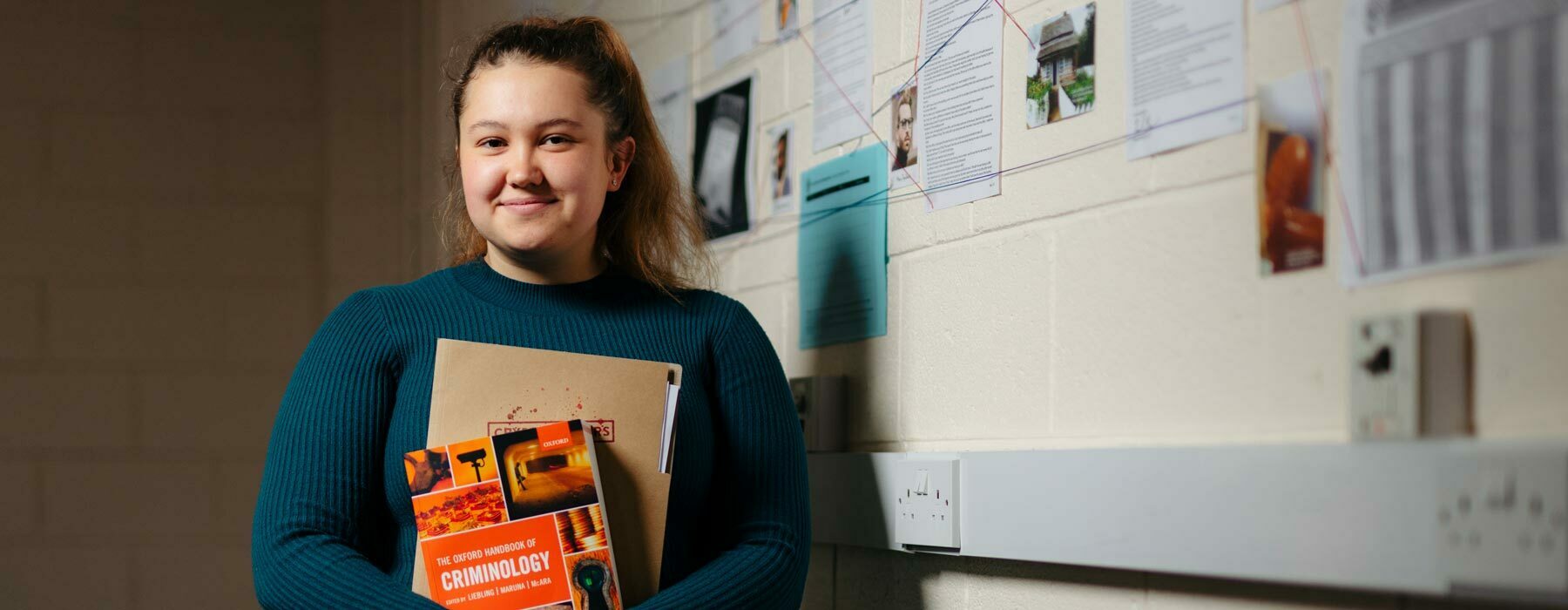
BA (Hons) Criminology with Psychology [Top Up]
Apply Full-Time Apply Part-Time Enquire about this course Download Course InformationJump to
Subject
Criminology and Psychology
Level
Bachelors Degree (Level 6)
Duration
1 year full-time/2 years part-time
Start Date
September 2026
The course
This is a course that lends itself to understanding theory of crime psychology whilst engaging you in real-world practical experiences. The modern investigator requires a range of skills both criminological and psychological. The balance of delivery prepares you for processes at a crime scene, investigative techniques and file/report construction to present your findings. Written collaboratively with the Criminal Justice System, this Top Up degree will prepare you for a range of roles and/or further studies in this specialist investigative area.
Course Information
- Demonstrating a detailed and sophisticated knowledge of ethical, cultural influences and contemporary contexts within social sciences
- Develop and deliver an agreed outcome based on the critical evaluation of research information
- Employing relevant digital information and communication technologies proficiently to generate ideas, present arguments and outcomes through collaborative practices and conference presentations
- Employing selected research methodologies to generate ideas and be able to present a range of social solutions to solve specific challenges
- Solving social problems in practical and conceptual ways
- Communicating investigative and factual material, providing an informed critical insight into the context and social thought process for a successful result
- The acquisition and demonstration of conceptual knowledge within core areas of psychology. Understanding the empirical bases of the discipline.
- Evaluating the psychological interventions within the Criminal Justice System
- Demonstrating sustainable development focusing on interconnections and interdependencies between economic, social and environmental factors
- Investigation: Under the Microscope - this module will allow for real-world investigation, combining both criminological and psychological skills, whilst considering the failings in investigations and the subsequent consequences.
- Criminal Psychology and Penology - you will consider the penal system and What Works? What are the implications of incarceration and what are the alternatives?
- Dissertation - This is an independent research project of your choice.
- Visual Criminology: Social Media and Visual Narratives this module will address the contemporary approach to criminology through the means of social media. What are the implications and how is this converted into the new genre of creativity in social sciences?
- Crime and Corruption in the 4th Industrial Revolution - cybercrime, phishing, scams and data management will develop your greater understanding of the next generation of technology services.
You will need a Foundation Degree in a Social Science related subject (or related HND) or Ordinary Degree plus a Satisfactory Reference.
Life and/or experience of non-traditional students will be taken into account when considering applications. The successful completion of an entry task may be required when considering applications without the required formal entry qualifications.
If your first language is not English, or a Tier 4 student visa to study is required and GCSE grade C/4 English or equivalent is not held, English language proficiency level such as International English Language Testing System (IELTS) 6.0 overall (with a minimum 5.5 in each skill) will need evidencing.
This programme is delivered with a variety of learning and teaching approaches to include all students learning styles and preferences.
For all modules, theory lectures are delivered that aim to deliver the core content and provide the underpinning knowledge. To complement the theory lectures, students have group seminar sessions that are used to reinforce concepts delivered theoretically.
The teaching methods focus on facilitating a student centered approach to enhance the independent learning that takes place outside of the classroom.
As a full-time course, this programme includes approximately 10 to 16 hours a week of teaching, including lectures, seminars, debates and tutorials. You are also expected to carry out a significant amount of private study in addition to contact time (25-30 hours a week).
Studying part-time you will have approximately 5-7 hours of contact time each week, including lectures, seminars, practicals and tutorials. You are also expected to carry out a significant amount of private study in addition to contact time (18-20 hours a week).
Students can expect to receive their timetables during induction week.
- There may be additional costs for DBS if you are seeking additional experience within relevant sectors. The cost will be dependent on the level of check completed, and would be at your expense. You can check the current cost on the www.gov.uk website.
- A suitable electronic device, e.g. a laptop or tablet, with internet connectivity is required for accessing online learning.
- Any educational visits/trips and enrichment activities will be additional to the course fees. You will be made aware of these optional visits and associated costs as required.
- On successful completion of the programme, you will have the opportunity to graduate at a ceremony wearing formal dress. The hire of the formal dress is an additional cost.
Validated by University of Hull
We are proud to collaborate with University of Hull on the validation of this course.
This includes transforming our programmes to ensure that we meet the evolving needs of the sector, giving you the best opportunities for success when you graduate by having a competence-based focus. Find out more about competence-based higher education.
View the policies and procedures you would be agreeing to comply with by registering for this programme. This encompasses University of Hull Quality and Standards, including a Guide for Collaborative Provision students.
Financial Information
Find the full details of the fees associated with this programme and the financial support available.

